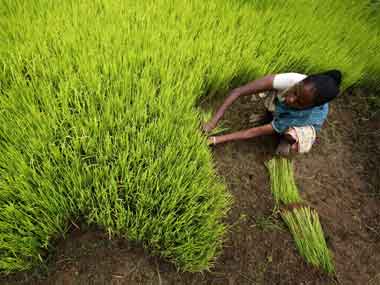What started as a small movement of non-cooperation is picking up steam in Andhra Pradesh and neighbouring southern states. It could threaten to engulf some northern states, too. If the movement spreads, the UPA’s Food Security Bill and anti-inflation strategy will be in tatters.
It all started with 500 farmers in Achanta, a village in Andhra Pradesh’s West Godavari district, covering around 4,500 acres of land. The farmers decided to declare a ‘crop holiday’, the agricultural equivalent of a manufacturing shutdown.
[caption id=“attachment_43900” align=“alignleft” width=“380” caption=“A crop holiday might affect the anti-inflation fight and put the proposed Food Security Bill in trouble. Anupam Nath/AP”]  [/caption]
The crop holiday has now spread to 300,000 acres in Andhra Pradesh alone, which would result in a loss of 1.5 million tonnes of rice for the year. This quantity is 5 lakh tonnes more than the government’s export quota for the year.
If the movement catches on in other states, Achanta could set off a new power struggle to change the terms of trade between industry and agriculture, urban and rural areas. This small village was a testing ground for the green revolution in the mid-1960s.
There are two main reasons for the farmers to ‘revolt’ in such a manner. The first is that the cost of production, after NREGA (National Rural Employment Guarantee Act) pushed up costs all-around. Even if the crop is sold at the minimum support price (MSP), farmers say they are making losses. This is because the data used to calculate the MSP of rice is based on 2007-08 numbers. A BusinessLine report explains how the economics of farming has swung against the farmer in recent times.
Labour costs have shot up over four-fold with the implementation of NREGA. During the peak agricultural season their cost is around Rs 350-400 per day. While there is no need to deny higher wages for the lowest sections of society, a similar increase in MSP was needed to offset this cost, as was recommended by the National Commission for Farmers, headed by Prof MS Swaminathan, aimed at redressing the distressing conditions of 600 million farmers. The commission had suggested increasing the MSP by 50 percent across the board. To ensure that NREGA does not make agriculture viable, the Centre has asked states to avoid making NREGA active during the peak agricultural season, says The Economic Times.
The difference between the wages of agriculture and non-agriculture workers has increased from 1:1.8 in 1950s to 1:5.2 in 2010; in other words, a person deciding to stay back in his village and work will be paid one-fifth of what he will get if he decides to work in a manufacturing sector. The 11th Plan highlights the tale of an agriculture worker when it says “GDP per agricultural worker is currently around Rs 2,000 per month, which is only about 75% higher in real terms than in 1950 compared to a four-fold increase in overall real per capita GDP”.
The second reason is the huge pile of foodgrain stocks. Farmers in Andhra Pradesh still have over 30 percent of their stock from the previous season. Taking advantage of the stock pile, millers in the area are procuring the produce at a huge discount to the MSP (Rs 6.5-7 per kg as compared to Rs 10.80 per kg of MSP).
The government’s decision to allow exports of rice came five months after it knew that the country would have a bumper crop. The only people who will benefit from this export quota are traders and millers who have the financial muscle to hold the inventory and take advantage of higher prices and such sudden quota releases.
According to a Nabard report, small and marginal farmers who account for 80 percent of total land holdings and 36 percent of area have no access to bank credit. Thus releasing an export quota, when the domestic farmer is bleeding is playing right in the hands of the traders (read hoarders).
The bigger problem is, such attitude of the government at a time when it is contemplating to introduce and implement the Food Security Bill, will be very dangerous for the agriculture sector. If the bill is enacted, grain procurement would increase to 60 million tonnes as compared to around 40 million tonnes currently. The MSP has to be properly calculated and implemented if the government is expecting success for the bill.
Which means the fight with inflation will start all over again.


)
)
)
)
)
)
)
)
)



